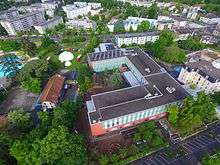Institut International de Lancy
 | |
Former names | Collège Marie-Thérèse |
|---|---|
| Motto | Travailler et réussir ensemble |
Motto in English | Work and succeed together |
| Type | International School |
| Established | 1903[1] |
| Director | Norbert Foerster |
| Students | 1,460 |
| Location |
Petit-Lancy, Genève, Switzerland 46°10′53″N 6°07′22″E / 46.1815°N 6.1228°ECoordinates: 46°10′53″N 6°07′22″E / 46.1815°N 6.1228°E |
| Website |
www |
The Institut International de Lancy (formerly known as the Collège Marie-Thérèse) is a private school located in Geneva, Switzerland.
History
Collège Marie-Thérèse was founded in 1903 soon after a law in France prohibited religious congregations of any persuasion.[1] In its early years the Collège was attended by approximately sixty girls, mainly boarders, from across Europe. The 1950s and 1960s was a period of expansion for the school resulting in several major changes: co-education was introduced throughout the school, and the curriculum was modified in order to provide pupils with a more personal curriculum at the higher secondary level. In April 2001 the name of the school was changed to Institut International de Lancy. An English-language Primary section was created the same year; an English-language Secondary section followed in 2005.
Objectives
The Institut International de Lancy, seeks to find and foster in each individual, their true potential; to encourage self-discipline and self-motivation; to instill a sense of purpose and awareness of the needs of other people; and to encourage responsibility and thoughtfulness in all they do. In order to attain these objectives the Institut endeavours to provide:
- French as a Foreign Language is taught across the school, irrespective of nationality, from Reception age through to Years 6/7
- A literary, scientific, artistic, social and physical education.
- A multi-national environment which will enable pupils to take their place in today's 'global village.'
- A respect for the individual, both pupil and teacher.
The current director is Mr.Norbert Foerster.
Curriculum
The school is committed to a curriculum of core and foundation subjects within a structure that follows the English National Curriculum («Cambridge International Examinations»)[2] and Baccalauréat en France.[3] The focus of the English National Curriculum, together with the wider school curriculum, is to ensure that pupils develop from an early age the essential literacy and numeracy skills they need to learn; to provide them with a guaranteed, full and rounded entitlement to learning; to foster their creativity; and to give teachers discretion to find the best ways to inspire in their pupils a joy and commitment to learning that will last a lifetime. The school now also provides the IB (International Baccalaureate).[4]
Notable alumni
References
- 1 2 Chronologie (in French) (in English)
- ↑ To find a Cambridge-schools of Geneva, search «Switzerland» and «Geneva»
- ↑ IIL et G.E.S.B.F. Site (in French)
- ↑ IIL at ib Site
External links
| Wikimedia Commons has media related to Institut International de Lancy. |